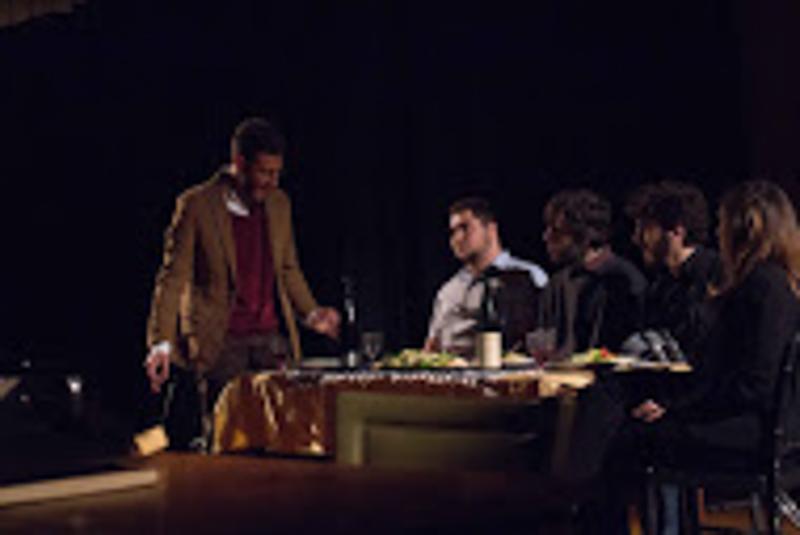‘The Admission’ Reimagines Shakespeare in the Middle East
College first-year Rashad Saleh, who played Avigdor in The Admission, delivers heated lines while College first-years Jad Seligman, Jackson Zinn-Rowthorn, David Kaus and Cora Browner look on. The play, which ran in Wilder Main April 7–9, tells the story of two families caught within the Israeli-Palestinian conflict.
April 15, 2016
The tandem story of two families, one Israeli and one Palestinian, depicted in the Oberlin Student Theater Association’s production of The Admission, begins on an unassuming note. Two men converse at a table, accompanied only by the nervous click of Wilder Main’s radiator. Details slowly emerge as more characters take their seats. Avigdor, played by College first-year Jackson Zinn-Rowthorn, owns a construction company. He has plans to build in the hometown of a man named Ibrahim (College first-year Rashad Saleh). Though civilized at first, the conversation soon adopts a tense edge. This strained dialogue quickly escalates, and Ibrahim begins to yell, demanding to know why Avigdor would dig on his home soil. The actors erupt into a frenzy while Ibrahim shouts, “It is forbidden!” He dramatically grabs a knife and lunges across the table, thrusting it into Avigdor’s heart. The lights immediately go out, leaving an atmosphere of quiet shock.
The opening scene of Israeli playwright Motti Lerner’s dramatic tale, which ran April 7–9 and was directed by College sophomore Naomi Greenspan and College first-year Kieran Minor, illustrates the intense personal conflict embedded within Israeli-Palestinian politics. The rest of the play focuses primarily on the character of Avigdor’s son Giora (College first-year David Kaus), a disabled Israeli veteran desperate to uncover the truth behind his father’s involvement in the massacre of a Palestinian village nearly 40 years prior. The show also presents a Romeo and Juliet-style romance as Giora, despite being engaged, has lingering feelings for Samya (College first-year Cora Browner), the daughter of his father’s enemy.
Friday’s performance went off without a hitch. Greenspan and Minor both demonstrated their ability to run a smooth production, and the actors all appeared engaged in the personalities and mannerisms of their respective characters.
The play itself carries an important message, bringing a much-needed sense of humanity to its discussion of the turbulent conflict between Israel and Palestine. Lerner contextualizes the story within historical events, but instead of explicitly taking sides, The Admission avoids condemnation by expressing the shared humanity between the contending forces. The play demonstrates that acts of violence and war leave deep, lasting physical and psychological impressions on everyone touched by conflict.
Much of the play’s moral core comes through in the dilemma presented to Giora, caught between his Israeli family and the Palestinian woman he loves. Kaus gave a powerful performance, a highlight of the show. The confusion and devastation in Kaus’ lines and body language as he embodied Giora’s struggle to make sense of his family history felt genuine. Other standout performances included Saleh as Ibrahim, who maintained a dark, brooding demeanor throughout despite his senility, and Browner as Samya, who carried a strong, commanding presence despite the efforts of other characters to control her.
OSTA’s production of The Admission was impressive, tackling sensitive subjects in a simultaneously mature and entertaining fashion. It proved OSTA’s willingness to deal with controversial topics to bring light to important issues, delivering powerful messages regarding the humanity within conflict and the boundary-breaking potential of love.
















